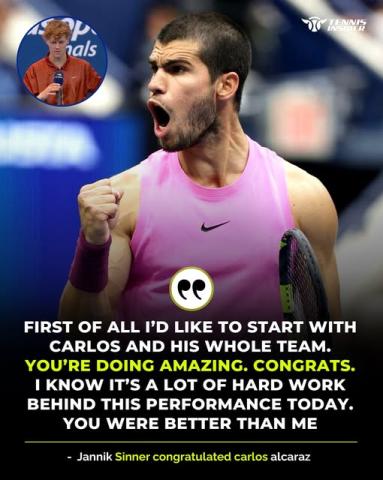
From the outside, the story of the 2025 US Open final is simple: Carlos Alcaraz put on a breathtaking display of tennis to defeat Jannik Sinner and reclaim his World No. 1 crown. But for those of us who analyze the game's nuances, the real story is a tapestry woven from two threads: Alcaraz’s transcendent performance and, just as importantly, Sinner’s uncharacteristic struggle and the profound respect he showed in its aftermath.
The Strategy That Wasn't: Dissecting Sinner's Off-Night
Let's be clear: Jannik Sinner did not lose this match solely because Carlos Alcaraz was brilliant. He lost because he was unable to produce the level of tennis that saw him ascend to the top of the game. The Sinner we expected—the human backboard with a sledgehammer forehand and impenetrable mental calm—was only present in flashes.
The core of Sinner's game is built on two pillars: relentless depth and taking the ball early to rob opponents of time. On Sunday night, both pillars crumbled. His groundstrokes, usually so precise and penetrating, landed consistently short in the mid-court. This was manna from heaven for Alcaraz, who feasts on these balls, stepping in to unleash his violent forehand or, more devastatingly, to deploy his feathery drop shot.
Tactically, he seemed stuck between two minds. The patient, grinding strategy that works against almost every other player is often insufficient against Alcaraz’s creativity. Yet the alternative—going for broke and trying to out-power the power—is a high-risk gamble that plays directly into Alcaraz’s strengths in creating chaos. Sinner never truly committed to one path, leaving him in a frustrating no-man's-land, reacting instead of dictating.
The Mental Battle: The True Turning Point
The most telling sign of Sinner's struggle wasn't technical; it was mental. The "Iceman" persona, usually so unflappable, showed cracks. After missing key opportunities, particularly in the second set, there was a visible dip in his body language—a frustrated look to his box, a slackened shoulder on the walk back to the baseline.
Against a predator like Alcaraz, these moments of frustration are like blood in the water. Alcaraz sensed the hesitation, the doubt, and pounced, amplifying his own aggression and audacity. Sinner’s greatest weapon—his mental fortitude—was neutralized, and without it, his entire game plan unraveled. He was never able to establish a rhythm or find a tactical answer to the storm of variety Alcaraz was unleashing.
Champion's Class: Sinner's Post-Match Respect
This is where the narrative transforms from a simple analysis of a match to a lesson in sportsmanship. In his post-match press conference, a visibly disappointed Sinner did not make excuses. He did not blame an injury, the night wind in Ashe, or a bad call. Instead, he looked into the cameras and offered a masterclass in grace.
"He was just better today," Sinner stated, his voice even. "What Carlos is doing is incredible for our sport. He pushed me to my limit, and today my limit was not enough. I have to go back, work harder, and try to find solutions. To play against him is a challenge, but it is one that makes me a better player."
These words are not empty platitudes. They are the mark of a true champion. He publicly hailed Alcaraz’s triumph, acknowledging his opponent's historic achievement without a hint of bitterness. In doing so, he accomplished two things: he protected his own mindset, framing the loss as a learning opportunity rather than a failure, and he paid the highest possible respect to his rival.
The Bigger Picture: A Rivalry Forged in Respect
This moment cements what we already knew: the Alcaraz-Sinner rivalry is the future of men's tennis, and it is built on a foundation of mutual respect that elevates them both. Their contrasting styles—Sinner's laser-guided power vs. Alcaraz's chaotic genius—create a perfect spectacle.
But it is their character off the court that will define their legacy. Sinner’s ability to handle a defeat, where he felt he did not give his full performance, with such dignity and clarity, speaks volumes about his champion's mentality. It proves that his class is not dependent on victory.
For Alcaraz, this victory is sweeter knowing it was earned against the very best. And for Sinner, this defeat, however painful, is not an end. It is merely a chapter. He now has the blueprint of what he must overcome, both in Alcaraz and within himself. The tennis world should be thrilled. This rivalry is just getting started, and it is being played by two phenomenal talents who are also, thankfully, phenomenal people.
